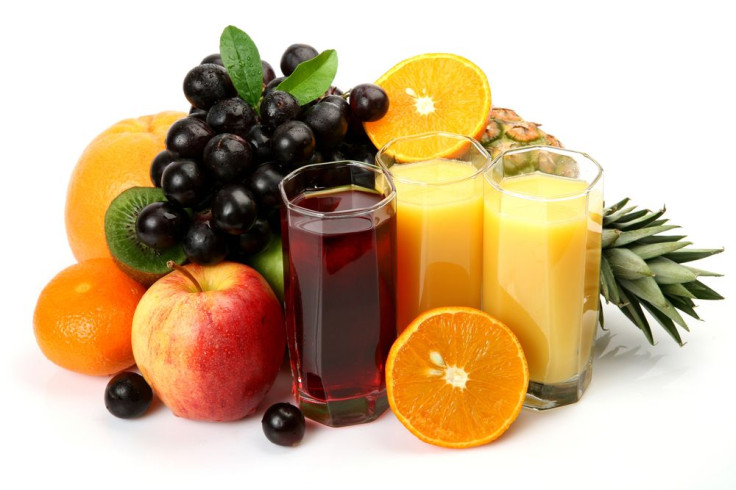Fruit Juice May Not Be Healthier Than Soda; It's Loaded With Sugar And Slows Metabolism

At this point, we all know soda isn’t the best beverage choice for a healthy diet, but are fruit juices any better? A string of recent studies have revealed that too much juice in our diet can lead to various health complications including diabetes, cardiovascular disease, liver damage, and even obesity. With the same amount of calories and sugar as a carbonated soft drink, it may be high time for a switch to water or homemade juice rather than store-bought fruit juice brands. If water is too bland or too boring for you, add a little flavor with a lemon or lime wedge to enhance the flavor.
“Around 60 to 80 percent of our apple juice comes from China, the biggest producer of arsenic in the world,” certified nutrition expert, Dr. Josh Axe told Medical Daily. “So what we are actually getting is fruit that is initially loaded with pesticides that has all of its fiber pressed out to get the actual juice. The remaining liquid is then pasteurized at 280 degrees, which kills all of its enzymes. Fiber and enzymes are the essential parts of fruit that help with the digestion process. The result of this process is turned into a concentrate or powder and turned back into a liquid by adding tap water, food coloring, and sometimes more sugar.”
University of Glasgow researchers Professor Naveed Sattar and Dr. Jason Gil co-wrote a piece in The Lancet Diabetes and Endocrinology journal warning consumers to limit their daily fruit juice intake to less than 150 milliliters a day. Compared to the 105 kcal and 26.5 grams of sugar found in 250 ml of soda, the same amount of apple juice contains 110 kcal and 26 grams of sugar. The research team stated that the common misconception surrounding fruit juices' and smoothies' low calorie and sugar content compared to soda can cause consumers to binge on store-bought products without a fear of unhealthy side effects. After surveying over 2,000 adults, Sattar and Gil found that 48 percent had underestimated the amount of sugar hiding in fruit juices and smoothies.
Here are five fruit and vegetable juice companies that spend millions of dollars to block GMO labeling:
1. V8
Although it boasts “100% Vegetable Juice” on the front of its label, if you turn around a V8 bottle, you’ll find some not-so-natural ingredients hiding on its label. They include: tomato juice from concentrate, reconstituted vegetable juice, flavoring, and citric acid. V8 juice also falls victim to pasteurization, the process of heating up a liquid to destroy bacteria and prolong shelf life. While pasteurizing the fruit/vegetable juice helps to destroy microorganisms, it also eradicates most of its healthy vitamins, minerals, and enzymes.
2. Odwalla
Odwalla, whose parent company is none other than Coca-Cola, may consider itself gluten free and vegan friendly, but one glance at the its nutritional facts and you can begin to really see what’s going on. For example, a 12 fl oz bottle of Odwalla’s fruit smoothie Mango Tango contains 220 calories and 44 grams of sugar. Any natural ingredients found in Odwalla are also stripped of its nutrients during the process of pasteurization.
3. Naked
Naked Juice’s parent company PepsiCo Inc. was recently forced to pay a $9 million settlement after claiming its products use an “added boost of vitamins” when, in fact, its “natural” vitamins are actually synthetic ingredients. The company was also forced the drop the words “all natural” from its labeling after it was discovered Naked’s ingredients are anything but organic. A 16 fl oz. bottle of Naked’s Blue Machine juice smoothie contains 340 calories and 58 grams of sugar. Naked juices are yet another victim of pasteurization.
4. Tropicana
Tropicana, owned by PepsiCo Inc. (starting to notice a trend here), would like you to believe it's “not from concentrate” products are the perfect way to start your day, but getting vitamin C from an actual orange is probably your best option. To defend against accusations that Tropicana’s “not from concentrate” products contain just as many calories and grams of sugar as soda, the company released its low-calories, low-sugar substitute Trop50 marketed as “50% less sugar and calories.” What it doesn’t tell you is that the secret behind stripping away some of its sugar and calorie content is simply adding more water. Eight fl oz. of Tropicana Pure Premium Some Pulp contains 110 calories and 22 grams of sugar.
5. Welch’s
Don’t be fooled by Welch’s “100% real fruit” labeling (it’s more like 25% real fruit). Flip around the bottle and you’ll soon realize that its first ingredient is water followed by high fructose corn syrup, something the company actively tries to hide. Welch’s website doesn’t even offer up its product’s ingredients list. However, the company’s misleading marketing and labeling strategy was not overlooked by the Center for Science in the Public Interest. Eight fl oz. of Welch’s Mixed-Berry Blend contains 140 calories and 33 grams of sugar.



























